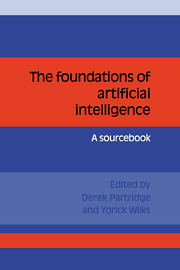Book contents
- Frontmatter
- Contents
- List of contributors
- Preface
- Acknowledgments
- 1 Introduction
- 2 The formal foundations of AI
- Non-monotonic reasoning versus logic programming: a new perspective
- Prolegomena to a theory of mechanized formal reasoning
- 3 Levels of theory
- 4 Programs and theories
- 5 The role of representations
- 6 The role of programs in AI
- 7 Rational reconstruction as an AI methodology
- 8 Is AI special in regard to its methodology?
- 9 Does connectionism provide a new paradigm for AI?
- 10 The role of correctness in AI
- 11 Limitations on current AI technology
- 12 Annotated bibliography on the foundations of AI
- Index of names
Prolegomena to a theory of mechanized formal reasoning
Published online by Cambridge University Press: 03 May 2010
- Frontmatter
- Contents
- List of contributors
- Preface
- Acknowledgments
- 1 Introduction
- 2 The formal foundations of AI
- Non-monotonic reasoning versus logic programming: a new perspective
- Prolegomena to a theory of mechanized formal reasoning
- 3 Levels of theory
- 4 Programs and theories
- 5 The role of representations
- 6 The role of programs in AI
- 7 Rational reconstruction as an AI methodology
- 8 Is AI special in regard to its methodology?
- 9 Does connectionism provide a new paradigm for AI?
- 10 The role of correctness in AI
- 11 Limitations on current AI technology
- 12 Annotated bibliography on the foundations of AI
- Index of names
Summary
Introduction
The title of this paper contains both the words “mechanized” and “theory.” I want to make the point that the ideas presented here are not only of interest to theoreticians. I believe that any theory of interest to artificial intelligence must be realizable on a computer.
I am going to describe a working computer program, FOL, that embodies the mechanization of the ideas of logicians about theories of reasoning. This system converses with users in some first-order language. I will also explain how to build a new structure in which theory and metatheory interact in a particularly natural way. This structure has the additional property that it can be designed to reason about itself. This kind of self-reflexive logical structure is new and discussion of the full extent of its power will appear in another paper.
The purpose of this paper is to set down the main ideas underlying the system. Each example in this paper was chosen to illustrate an idea and each idea is developed by showing how the corresponding FOL feature works. I will not present difficult examples. More extensive examples and discussions of the limits of these features will be described in other places. The real power of this theory (and FOL) comes from an understanding of the interaction of these separate features. This means that after this paper is read it still requires some work to see how all of these features can be used. Complex examples will only confuse the issues at this point. Before these can be explained, the logical system must be fully understood.
Information
- Type
- Chapter
- Information
- The Foundations of Artificial IntelligenceA Sourcebook, pp. 72 - 94Publisher: Cambridge University PressPrint publication year: 1990
